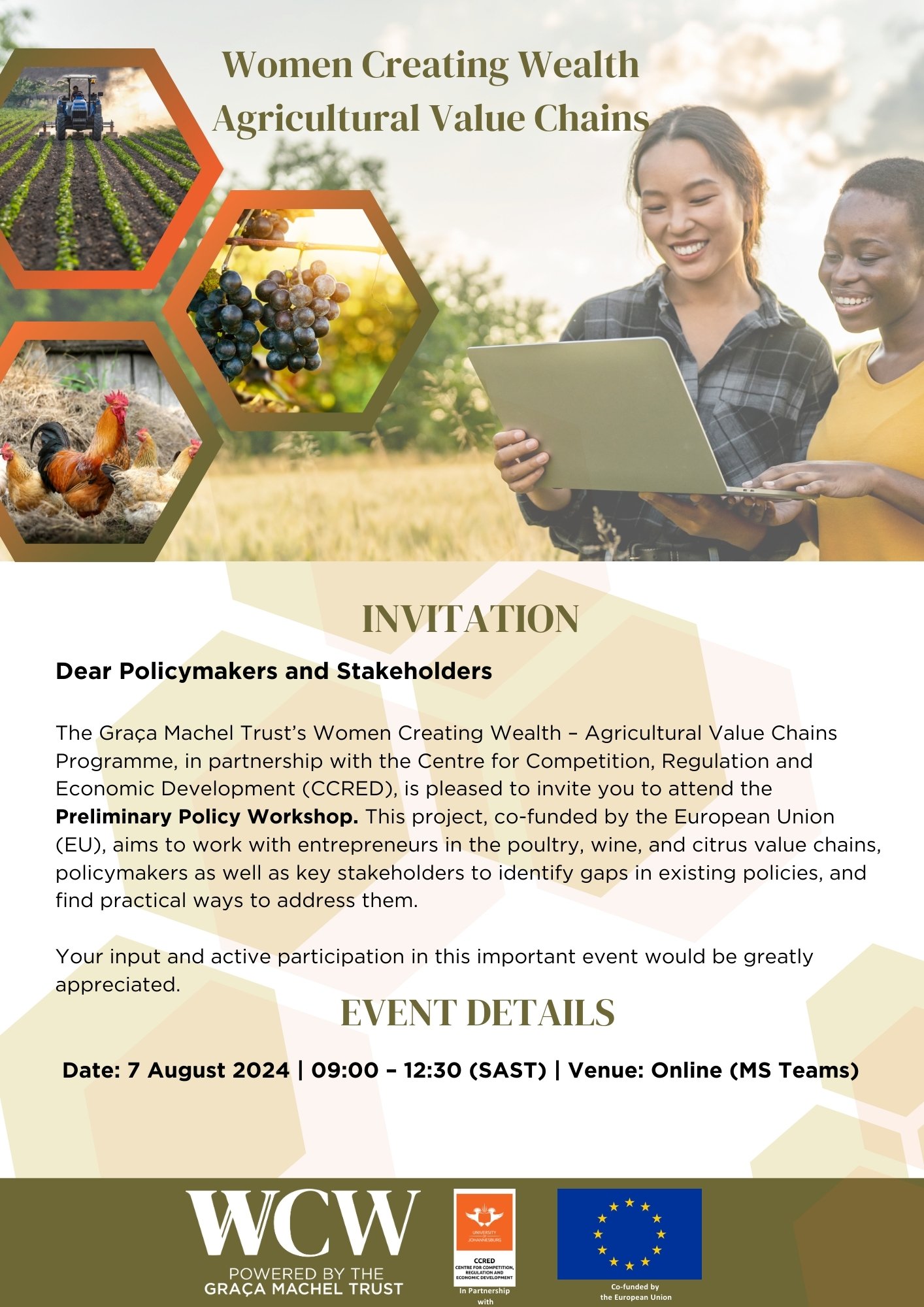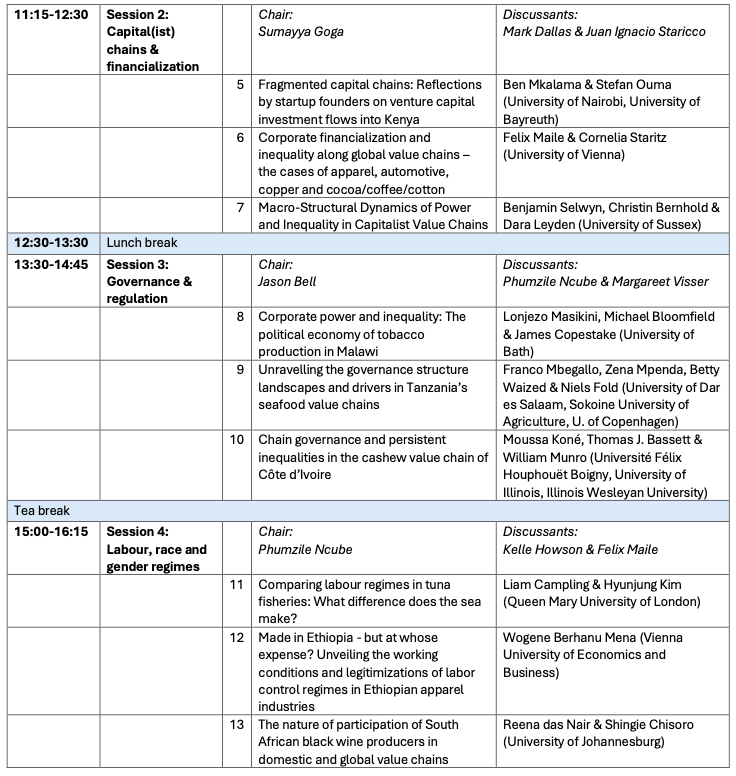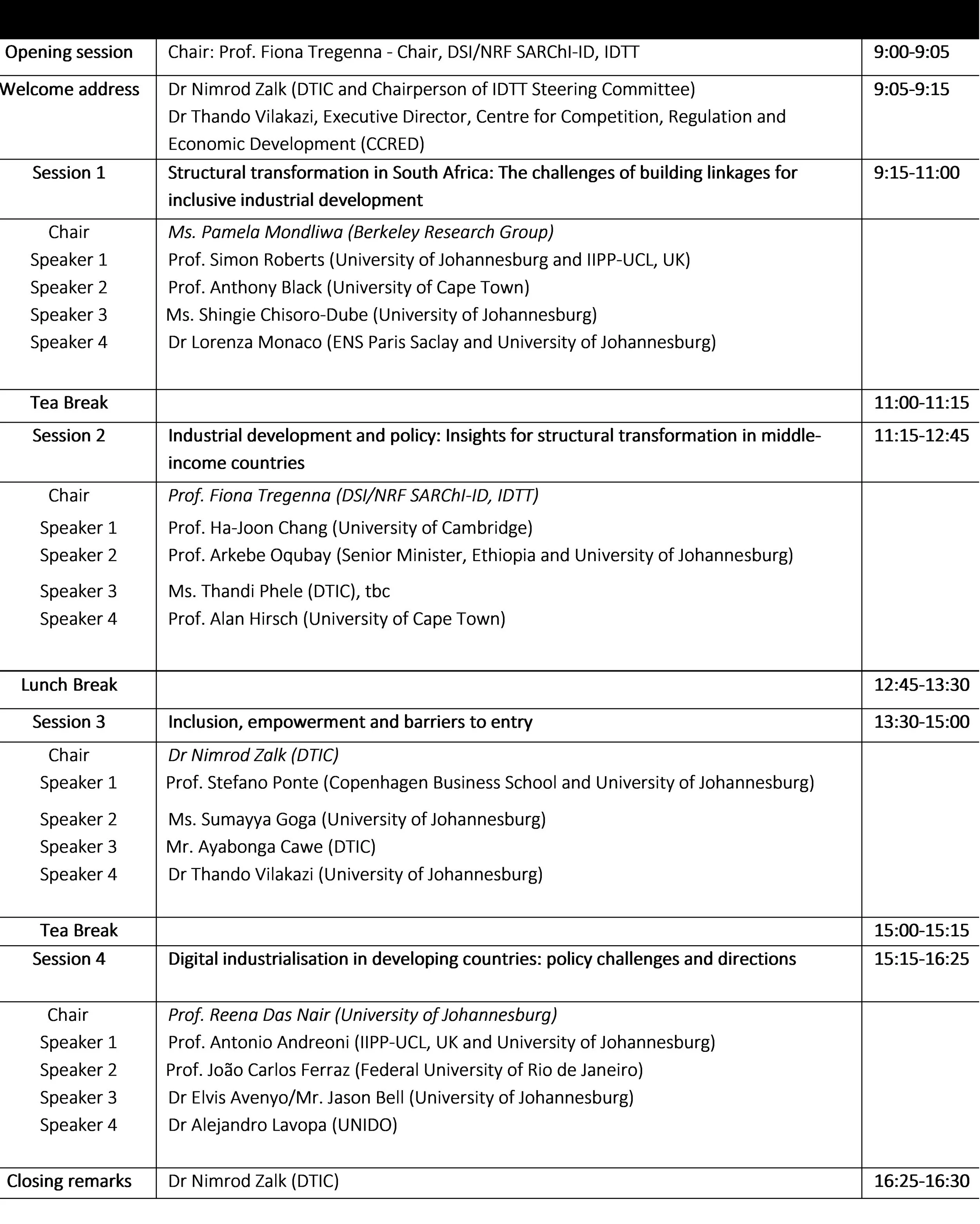Research Conference: Power and Inequality in Value Chains and Production Networks
13 and 14 June 2024
Venue: Johannesburg Business School, University of Johannesburg (JBS Park, 69 Kingsway Road, Auckland Park, Johannesburg)
The globalization of production has yielded new winners and losers within and across nations, spurring much debate on the different forms of inequality that it engenders. There is also increasing interest in how the emergence and consolidation of global, regional and local value chains and production networks
may exacerbate inequalities – and whether and how value chains may be leveraged to mitigate them. The dominant discourse speaks for more widespread inclusion and upgrading towards higher value-added activities as the main pathways for addressing global North-South inequalities. But despite massive value chain participation, many Global South actors have failed to significantly improve and/or retain the value added they create. Existing power dynamics within value chains and production networks have been shown to play a significant role in limiting the success of upgrading efforts and value chain-led development more broadly, contributing to persistent inequalities.
Scholars are therefore asking critical questions about the degree to which participation in value chains facilitates positive outcomes – such as improved firm competitiveness, employment generation, better working conditions and livelihoods – and/or negative ones, like immiserating growth, environmental degradation, labour exploitation, and increased inequality.
While the role of various forms of power is being increasingly examined in the analysis of governance in value chains and production networks, inequality has been approached rather implicitly and has often been confused or equated with power asymmetries. In this conference, we seek to more systematically link analyses of power in value chains and production networks with different dimensions of inequality. We thereby aim to engage with the conditions under which inequalities are challenged, mitigated,
or exacerbated.
Past research has shown that power and inequality may reinforce each other, but also that there can be trajectories of change. Power asymmetries may be contested by supposedly ‘powerless’ actors; disruptive events such as the COVID-19 pandemic may reshuffle power constellations; ‘silent’ powerful actors such as regulatory institutions may reclaim influence; and private and public governance instruments may shift power balances, in turn re-shaping existing inequalities.
To identify time-sensitive action points, where political pressure or strategic action in relation to disadvantaged actors is possible and effective, we seek to further develop analytical frameworks that can guide a more focused and empirically comparable study of how power dynamics shape different dimensions of inequality in value chains and production networks.
To take stock of the state of the art in this field and chart new research and policy directions, the Centre for Business and Development Studies (CBDS), Copenhagen Business School and the Centre for Competition, Regulation and Economic Development (CCRED), School of Economics, University of Johannesburg are organising a two-day international conference.
For any question of clarification you may need, please contact the organizers via email.
Click here to download the programme.
Climate change, ‘just’ transition and structural transformation
Wednesday 17 August 2022
10h00 – 13h05
The acceleration of climate change and the rollout of ‘green standards’ and policies pose diverse opportunities, challenges, and risks to developing countries including South Africa. The uncertainty of the opportunities further presents threats and challenges to South Africa’s green re-industrialisation agenda.
This workshop will report on the work of the Industrial Development Think Tank (IDTT) around climate change, ‘just’ transition, and structural transformation, as well as provide reflections from a broader range of stakeholders around these issues. The workshop aims to bring researchers from the Centre for Competition, Regulation and Economic Development (CCRED), the University of WITS, the African Climate Foundation, and the Trade and Industrial Policy Strategies (TIPS) as well as policymakers and advisors, and private sector representatives to debate South Africa’s ‘just’ transition strategy and the implications for sustainable industrialisation and industrial policy.
For more information/RSVP: YDavis@thedtic.gov.za
SYMPOSIUM ON STRUCTURAL TRANSFORMATION AND INCLUSIVE INDUSTRIAL DEVELOPMENT: THE RELEVANCE OF SOUTH AFRICA’S CHALLENGES AND EXPERIENCE
Date: 3 November 2021 | Time: 9:00 – 16:30 SAT
Hybrid event (online and in-person at UJ)
New global drivers of change — digitalisation, global value-chain consolidation and sustainability management — pose challenges and opportunities for structural transformation in developing countries. Drawing on our new book Structural Transformation in South Africa: The Challenges of Inclusive Industrial Development in a Middle-Income Country (published by Oxford University Press, open access online), the Centre for Competition, Regulation and Economic Development (CCRED) and the DSI/NRF South African Research Chair in Industrial Development (SARChI-ID), on behalf of the Industrial Development Think Tank (IDTT) at the University of Johannesburg, are excited to convene this symposium.
The broad evidence marshalled in the book shows that firms have struggled to build their productive capabilities, diversify their production activities and develop domestic linkages. Given this weakening industrial base, engagements with GVCs and the emerging technologies of the fourth industrial revolution have been limited and have generally not yet delivered the desired outcomes. New thinking based on detailed empirical analysis is necessary together with building supportive coalitions for agile policy-making.
The symposium will reflect on these issues, and consider what is needed for real structural transformation for sustained and sustainable prosperity, increased economic participation, and social and economic resilience. The symposium brings together international and local experts (including authors of book chapters and those who have endorsed the book), with policymakers from government and key institutions of industrial policy in South Africa.
All sessions will be hosted at UJ (Ubuntu Chambers [former Council Chambers]) and also online at:https://us02web.zoom.us/meeting/register/tZ0pdOiuqjsiHtGcRbtNzORFzYy-rkE5ZBwC. Please RSVP to Koketso Manyane-Dlangamandla (koketsom@uj.ac.za), indicating whether you will attend online or in person, by 28 October 2021.
Strict COVID-19 health protocols will be observed at the venue.
Regional investments by emerging African multinational corporations
Effective regional integration and competition requires that there be independent rivals competing across borders and within domestic markets through innovation and effort, investment, product quality, and prices. To understand the constraints to more dynamic rivalry between firms within the region, this research considers the obstacles to integration from the perspective of fostering the development of domestic firms with strong, regional capabilities. CCRED and UNU-WIDER are jointly holding a seminar to explore these issues based on insights from two studies conducted by CCRED under the Southern Africa – Towards Inclusive Economic Development (SA-TIED) work stream on Regional growth and development for Southern Africa’s prosperity.
Opening the Economy: A call to action
Johannesburg, 2 December 2020, Online
15:00 – 16:00 (SAST)
CCRED invites you to a launch event on 2 December 2020 to
Celebrate the appointment of Acting Judge and former Competition Tribunal Chair Norman Manoim as Professor of Practice at the University of Johannesburg, and
Launch the book Opening the South African Economy: Barriers to Entry & Competition edited by Thando Vilakazi, Sumayya Goga & Simon Roberts
The book assesses the challenges facing entrepreneurs and how they can be overcome through in-depth case studies focused on selected markets and firms. From these studies an agenda is proposed for more effective regulation and competition enforcement; development finance and patient capital for challenger firms; opening-up routes to markets across sectors; and, reorienting government support to work for smaller businesses.
Welcoming remarks will be delivered by Prof Daneel Van Lill (Dean, College of Business and Economics, UJ) and Dr Thando Vilakazi (Director, CCRED). A panel of expert discussants will also reflect on how insights from the book can be carried forwards:
Prof Norman Manoim, Acting Judge in the South Gauteng High Court
Mr Hardin Ratshisusu, Deputy Commissioner of the Competition Commission
Ms Korkor Cudjoe, Women’s Economic and Social Advancement Programme Technical Advisor - Graca Machel Trust
Register for the online session here
Fighting Cross-Border Cartels The Perspective of the Young and Small Competition Authorities
The University of Johannesburg’s Centre for Competition, Regulation and Economic Development (CCRED) will be hosting an online launch of the book titled Fighting Cross- Border Cartels: The Perspective of the Young and Small Competition Authorities by Dr. Pierre Horna
CCRED MASTERCLASS: The interpretation of economic issues in competition law - Acting Judge Norman Manoim
MASTERCLASS
The interpretation of economic issues in competition law
by
Acting Judge Norman Manoim
Monday, 14 September 2020, 16:00 -17:30
Join AJ Norman Manoim as he delivers a Masterclass on the interpretation of economic issues in competition law in line with the goals of efficiency, consumer welfare and public interest. AJ Manoim will unpack how courts apply the law, and the difficulties they face in applying the law, to solve economic problems. He will also draw on the role of competition regulation in the time of COVID-19.
This Masterclass forms part of the lecture series in the Advanced Economics of Competition and Regulation module in the MCom in Competition and Economic Regulation programme at UJ.
AJ Manoim is currently an acting judge in the South Gauteng High Court. He was also the Acting Director of the Mandela Institute at the University of Witwatersrand until January 2020. Prior to this, AJ Manoim served two terms as the Chairperson of the Competition Tribunal having first been appointed to that position in 2009. He has served as a full-time member of the Competition Tribunal since its inception in September 1999. He was a member of the team that drafted the South African Competition Act of 1998. Prior to joining the Competition Tribunal, he was the managing partner of Cheadle, Thompson and Haysom, a Johannesburg firm of attorneys. AJ Manoim is also a part-time lecturer in competition law at the University of Witwatersrand.
Click here to register in advance for this webinar
For any queries, please contact:
Dr Reena das Nair
Senior Lecturer and Programme Coordinator. School of Economics, College of Business and Economics
Senior Researcher. Centre for Competition, Regulation and Economic Development
University of Johannesburg
1st Floor, 6 Sturdee Avenue, Rosebank, 2196
Tel: +27 11 559 7511 | Cell: +27 82 546 9705 | E-mail: reenadn@uj.ac.za
www.competition.org.za
Webinar: Local production systems in machinery and equipment
Presented by the IDTT
Wednesday 22 July 2020, 13:30 -15:00
The Department of Trade, Industry and Competition (the dtic) in partnership with the Centre for Competition, Regulation and Economic Development (CCRED) and the South African Research Chairs Initiative (SARChi) established the Industrial Development Think Tank (IDTT) to conduct research, improve capacity and provide analysis around issues of industrialisation. Research under the IDTT focuses mainly on issues of structural transformation of the South African economy.
As part of this programme, the IDTT would like to invite you to the presentation of the “Local production systems in machinery and equipment” study series:
“Critical review of international cluster and other sector support initiatives in the mining equipment and machinery sector” presented by Mr Ian Steuart.
“The role of lead firms in the development of production ecosystems in process equipment and aerospace” presented by Ms Pamela Mondliwa
Chair: Dr Nimrod Zalk, the Industrial Development Policy and Strategy Advisor at the dtic.
The industry study series also forms part of the Industrial Policy Training Programme of the dtic, aimed at sector development to strengthen skills of the dtic employees as well as the broader public sector around issues of industrial policy.
Register in advance for this webinar:
https://us02web.zoom.us/webinar/register/WN_fQkF0H_oQa-7sICTlfiDOw
After registering, you will receive a confirmation email containing information about joining the webinar.
With regards
Yvonne Davis
Specialist: Industrial Policy Advisory Unit
The Department of Trade, Industry and Competition (DTIC)
Western Cape Regional Office
YDavis@thedtic.gov.za
(021) 480 80 54
CCRED MASTERCLASS: Abuse of dominance
Price-cost tests for conditional rebates: insights from European cases
by
Professor Chiara Fumagalli
In case you missed it, the CCRED Masterclass held on 27 July 2020 is now available on CCRED’s YouTube channel!
You can find updates about upcoming CCRED and Industrial Development Think Tank COVID-19 policy briefs and webinars on our website, CCRED blog and our other social media sites. The discussion continues @CCRED_UJ
Background
Join Professor Chiara Fumagalli as she delivers a Masterclass on the economic tests for conditional rebates in Abuse of Dominance cases. Prof. Fumagalli will discuss key European cases, such as Intel, ZF Meritor and Qualcomm, providing valuable insights for application in abuse of dominance cases in Africa.
This Masterclass forms part of the lecture series in the Advanced Economics of Competition and Regulation module in the MCom in Competition and Economic Regulation programme at UJ.
Prof. Chiara Fumagalli is the Avv. Giovanni Agnelli endowed Associate Professor in Economics at the University of Bocconi. Chiara has taught at a number of leading universities as well as on the Barcelona Graduate School of Economics Intensive Course on Competition Economics. She published a book in 2018, 'Exclusionary Practices – The Economics of Monopolisation and Abuse of Dominance’ (with M. Motta and C. Calcagno), Cambridge University Press. The book develops a general analytical framework to identify clear and workable criteria that can guide antitrust agencies in analysing exclusionary practices and is a key text for the MCom programme.
CCRED Webinar: Competition Commission Buyer Power Guidelines – towards greater certainty and support for SMEs?
In case you missed it, the CCRED Excessive Pricing Webinar held on 2 June 2020 is now available on CCRED’s YouTube channel!
You can find updates about upcoming CCRED and Industrial Development Think Tank COVID-19 policy briefs and webinars on our website, CCRED blog and our other social media sites. The discussion continues @CCRED_UJ #ExcessivePricingSA
Background:
Recognising the vulnerability of SMEs in the designated sectors of agro-processing, grocery wholesale & retail, and ecommerce & online services, the new enforcement provisions in the amended Competition Act seek to support and protect them against the abuse of buyer power by dominant firms. On 18 May 2020, the Competition Commission of South Africa released guidelines outlining how cases of buyer power would be screened, interpreted and assessed under the new provisions.
The timing of the release of these guidelines is significant. SMEs are particularly hard hit by the COVID-19 pandemic, and anticompetitive conduct can exacerbate their precarious positions, excluding them from effectively participating in the economy. On the other hand, dominant buyers also require clarity on the new provisions and guidance on what practices could be considered a contravention.
Do the new guidelines go far enough in both supporting SMEs and in providing certainty for dominant firms in the designated sectors? Join CCRED and the Industrial Development Think Tank as we debate these issues with the Competition Commission and economic and legal experts in the field.
Panelists:
Mr Yongama Njisane, Principal Economist and Head of the Technical Committee on Grocery Retail Inquiry, Competition Commission of South Africa
Ms Fatima Maria Fiandeiro – Partner in the Competition and Regulatory Economics practice, Genesis Analytics
Mr Derek Lötter - Co-Head of the Competition Practice, Bowmans
Ms Sha’ista Goga – Director, Acacia Economics and Research Associate, CCRED
Host: Ms Pamela Mondliwa, Senior Researcher, CCRED, University of Johannesburg
Colloquium on COVID-19 and the African Continental Free Trade Agreement (AfCFTA)
The Nelson Mandela School of Public Governance is hosting a Webinar Series: Africa’s response to COVID-19. This Colloquium, the second installment of this Webinar series, is hosted in partnership with TIPS, CCLA, and CCRED. Please do join our discussion on the topic: How the AfCFTA could stimulate an inclusive and developmental post-COVID-19 economic revival
Date: Tuesday, 19 May 2020
Time: 10:00am to 12:00pm (CAT)
Follow the link to join Zoom meeting
Zoom Meeting ID: 934 8799 2577
The speakers include: Wamkele Mene, the Secretary-General of the AfCFTA; Caroline Ncube, Professor at the UCT Law Faculty; Desta Melaku, Advisor to the UN Economic Commission for African; Rob Davies, the former South African Minister of Trade and Industry; Sope Williams-Elegbe, Professor at Stellenbosch University and Adeyemi Dipeolu, the Special Adviser to the President on Economic Matters in the Office of the Vice-President of Nigeria.
The discussants include: Taffere Tesfaschew, Advisor Ethiopian Investment Commission; Saliem Fakir, Executive African Climate Foundation; Tapiwa Cheuka, PhD Student, and Marumo Nkomo, PhD Student.
For more information please contact Clever Chikwanda: clever.chikwanda@uct.ac.za
CCRED Zoom Webinar: Price regulation and excessive pricing in times of crisis – a view from South Africa
In case you missed it, the CCRED Excessive Pricing Webinar held on 6 May 2020 is now available on CCRED’s YouTube channel!
Over 300 participants from 30 countries joined us for an insightful discussion with our panel of experts. The discussion continues @CCRED_UJ #ExcessivePricingSA.
You can find updates about upcoming CCRED and Industrial Development Think Tank COVID-19 policy briefs and webinars on our website, CCRED blog and our other social media sites.
Background:
The regulation of prices using competition law is unusual, but arguably necessary in a time of crisis. But what constitutes an excessive price under distorted market conditions, and how should dominance and market power be considered?
South Africa’s approach to dealing with the excessive pricing of essential goods and services during the State of National Disaster is novel and has drawn widespread local and international interest. Prices are deemed to be excessive under the new regulations if they are above those set prior to March 2020, and not justified by higher costs. The Competition Commission’s recent referrals to the Competition Tribunal against Babelegi Workwear Overall Manufacturers & Industrial Supplies, and Dis-Chem Pharmacies for inflating the prices of surgical face masks will put the approach to the test.
Panelists:
Opening remarks: Prof Massimo Motta – ICREA Research Professor at Universitat Pompeu Fabra, and Barcelona Graduate School of Economics. See "Price regulation in times of crisis can be tricky"
Mr James Hodge – Chief Economist, Competition Commission of South Africa
Prof Nicola Theron – Senior Managing Director, Economic and Financial Consulting, FTI Consulting
Ms Pamela Mondliwa – Senior Researcher, CCRED, University of Johannesburg
Host: Dr. Reena das Nair, Senior Researcher, CCRED and Senior Lecturer, University of Johannesburg
The potential for cheap, high quality telecommunications services in Africa Panel Session
Thursday, 13th February 2020, 16:00 - 18:00
The importance of cheap, high-quality telecommunications services for economic development and growth are frequently stressed by policymakers, as is the need for greater regional integration and cooperation in Southern Africa. The link between the two is less well understood. Better, cheaper telecoms services can facilitate regional trade and integration, while cooperation between policymakers and regulators across countries to share learnings and best practice can assist in ensuring effective, pro-competitive policies and regulations which allow the sector to thrive and consumers to benefit. Unfortunately, current outcomes in both respects are disappointing. Southern Africa performs poorly on measures of access, price and speed. In 2017, less than 2% of the population in Sub-Saharan Africa had access to fixed line internet and less than 60% had access to 3G coverage according to the World Bank and the GSMA. The cost of communicating both within and between countries in the region is often high, and can be traced, at least in part, to insufficient competition and a lack of pro-competitive regulation.
CCRED and UNU-WIDER are jointly holding a seminar to elaborate on these challenges based on insights from two studies conducted by CCRED for a Southern Africa — Towards Inclusive Economic Development (SA-TIED) work stream on Regional growth for Southern Africa’s prosperity. The first paper explores and contrasts the competitive dynamics of the telecommunications sectors in South Africa, Tanzania, Zambia and Zimbabwe while the second paper compares the different approaches economic regulators have taken in each country and how this has helped to shape outcomes. We reflect on how the alignment of regulation (or lack thereof) across the region has influenced the current state of telecoms development in southern Africa and how it may be better harnessed in future for regional integration and growth.
Panelists: Ms Genna Robb (Research Associate, CCRED)
Chair: Dr Ryan Hawthorne (Acacia Economics)
Venue: CCRED Seminar Room, 1st Floor, 6 Sturdee Avenue, Rosebank, Johannesburg.
Date: 13 February 2020
Time: 16:00-18:00
RSVP by email to infoccred@uj.ac.za
Public seminar by Norman Manoim and Competition and Economic Regulation for Inclusive Growth in Southern Africa book launch
24 October 2019, 18:00-19:30
Venue: Chalsty Teaching and Conference Centre, Law School Building, West Campus, University of the Witwatersrand, Johannesburg
The new Competition Amendment Act, which comes into force on the 20th anniversary of the Competition Act, has changed the face of traditional competition law in South Africa in several ways. The Amendment Act includes a more explicit focus on inclusion, particularly of black owned businesses and SMEs, it specifically aims to address the buying and selling power of dominant firms, and it empowers the authorities, through market inquiries, with powers to break up firms if the markets in which they are operating are not functioning competitively, even if the firms have not contravened the law.
Do the recent amendments go far enough to deal with entrenched concentration and barriers to entry, and can they effectively contribute to addressing endemic inequality in South Africa? What can we learn from the record of competition law enforcement in South Africa and the power of the law to improve economic participation for marginalised groups and firms? What role is there for civil society and research in informing the work of competition authorities and realising the objectives of the competition law?
Public Seminar: The Mandela Institute (MI) at the University of Witwatersrand and CCRED at the University of Johannesburg are pleased to invite you to an Open Society Foundation public seminar presented by former Chairperson of the Competition Tribunal of South Africa and Acting Director of MI, Mr. Norman Manoim.
Book Launch: The session will include the launch of the edited volume by Profs Jonathan Klaaren, Simon Roberts and Imraan Valodia, titled Competition and Economic Regulation for Inclusive Growth in Southern Africa (2019, Jacana Publishers), which speaks to the challenges and impacts of competition law and economic regulation throughout Southern Africa.
Complementary copies of the book will be available for seminar attendees!
Date: 24 October 2019, 18:00-19:30, Light refreshments will be served.
Venue: Chalsty Teaching and Conference Centre, Law School Building, West Campus, University of the Witwatersrand, Johannesburg (Click here for directions)
RSVP: To Julius Nyamwena by 22 October 2019, at juliusn@uj.ac.za
CORPORATE SOCIAL RESPONSIBILITY AND THE LIMITS OF TRANSFORMATION IN SOUTH AFRICA
Since the 2012 Marikana killings there has been a boom in scholarship about labour relations in the South African mining sector, focused primarily on the ability of workers to organise and the role of state violence in policing strikes. Quality of life issues in mining communities are usually explored only insofar as they affect these labour relations. This focus is incomplete, because it ignores the way that services and infrastructure in mining communities affect local residents who have no formal links to the mine.
Disruptive technologies, sustainability management and the changing dynamics of global value chains
Stuck in the Middle: Premature deindustrialisation and industrial policy? South Africa's challenges in an international context
Benchmarking South Africa against international industrial performances and policy experiences offers an opportunity to identify those countries facing similar challenges and assess the extent to which their policy responses are feasible in the South African context, both from an economic and political economy perspectives. In this lecture two leading economists analyse the major global structural transformation underway in the industrial landscape, its impact on middle-income countries and the premature deindustrialisation trap.
Ripe for the picking? Exploiting South Africa’s potential in fruit to grow employment and increase participation
Strong growth in global demand for fresh fruit presents opportunities to grow exports, increase participation of emerging black farmers and create employment. However, challenges of market access and readiness, particularly phytosanitary standards, limited technical skills and capabilities, including logistics bottlenecks, limit this potential.
Panel Session on Innovation for inclusive and sustainable industrialisation
Most countries that have managed to reach high levels of economic and social development have done so by advancing their industrial sectors. However, industrialisation patterns currently coexist with profound disparities in economic performance across countries, regions and communities; as well as unsustainable environmental practices and effects.
This panel will discuss various ways in which innovation can support and be a driver of inclusive and sustainable industrialisation. The panellists will refer to ongoing efforts taking place: (1) at the ‘Community of Practice in Innovation and Inclusive industrialisation’ hosted by the SARChI in industrial development at UJ, (2) the Africalics Post-doctoral Programme on ‘Developing Innovation Capabilities for Sustainable and Inclusive Industrialisation in Africa’ in collaboration with Aalborg University (Denmark), and (3) the Industrial Development Think Tank (IDTT) housed in CCRED (UJ).
Panellists
Moderator: Dr Erika Kraemer-Mbula (Senior Researcher, SARChI in Industrial Development, University of Johannesburg)
- Dr Rasmus Lema (Aalborg University) – Innovation Trajectories in Developing Countries: Co-evolution of Global Value Chains and Innovation Systems
- Prof Edward Lorenz (University of Nice-Sophia Antipolis, France) – Emerging Technologies, Innovation and Sustainable Industrial Development in Africa
- Dr Ann Kingiri (African Centre for Technology Studies, Nairobi) – Understanding the diffusion and adoption of digital finance innovation in emerging economies: M-PESA money mobile transfer service in Kenya
- Ms Pamela Mondliwa (Centre for Competition, Regulation and Economic Development – CCRED, UJ) – Industry 4.0: Insights from South Africa
Date: 25 June 2018
Time: 16:00 to 18:00
Venue: CCRED Seminar Room, 1st Floor, 6 Sturdee Avenue, Rosebank, Johannesburg. Click here for map
RSVP by email to infoccred@uj.ac.za before 24 June 2018.















